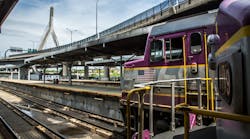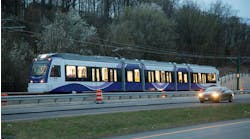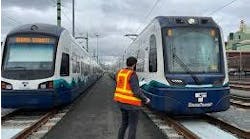MBTA to procure 80 bi-level commuter coaches from Hyundai-Rotem
The Massachusetts Bay Transportation Authority (MBTA) will procure 80 new bi-level commuter rail coaches to replace single-level cars following approval from the Fiscal and Management Control Board to award a contract to Hyundai-Rotem.
The $278.5 million contract for the new coaches will help MBTA increase capacity by more than 14,000 seats daily. A $41 million contract for engineering and program management services for the project was also awarded to WSP USA Inc., in close cooperation with Keville Enterprises, Inc., and VP Engineering, Inc.
While the total cost of this vehicle procurement is $278.5 million, the total project budget is $345.2 million, which includes professional services, force account, project administration and more with funding being provided by the commonwealth. The Notice to Proceed for the sole-source procurement of 80 coaches will be issued in October 2019 with the first vehicle anticipated to be delivered in September 2022 and the last anticipated in June 2024. In addition to these 80 coaches, the release of a Request for Proposals for additional bi-level coaches is anticipated for November 2019 with an award of procurement of up to 100 coaches, plus options, anticipated for November 2020. The first of those 100 coaches is anticipated to be delivered in July 2024 and the last in June 2027.
“As ridership on the commuter rail system continues to climb, our customers have made it very clear that additional capacity is necessary,” said MBTA General Manager Steve Poftak. “This procurement method is the fastest and most efficient way to meet the growing demand and provide our riders with improved service.”
The Hyundai-Rotem bi-levels will include upgrades and improvements such as LED lighting and the integration of positive train control. The coaches will be compatible with the current fleet and infrastructure and include an ease of maintenance. As these bi-levels are a reproduction of the current bi-level fleet, MBTA notes the additional benefits include a workforce familiarity with the design; minimal operating and maintenance training required; guaranteed compatibility with the existing fleet and minimal design impacts.
Recent studies have shown an increase in commuter rail ridership, which will be further impacted when South Coast Rail comes online and by multiple MassDOT highway projects that are scheduled soon.
MBTA explains as part of the procurement and vehicle implementation, coach vehicles will be replaced in steps. The first step addresses the immediate need for new coaches, which MBTA says is best accomplished through this sole-source contract with Hyundai-Rotem, expediting the replacement of the oldest, more unreliable of the aging fleet as well as supporting South Coast Rail’s system expansion. The second step is a competitively bid procurement for up to 100 bi-level coaches, plus options.
While addressing current needs, this procurement does not preclude the MBTA from choosing a different commuter rail vehicle type in the future. The future of the MBTA’s commuter rail system continues to be studied as part of Rail Vision, which identifies cost-effective strategies to transform the existing network that best supports improved mobility and economic competitiveness in Greater Boston. Rail Vision is currently exploring scenarios for how future commuter rail service could operate, including enhancement in vehicle technology.

Mischa Wanek-Libman | Group Editorial Director
Mischa Wanek-Libman is director of communications with Transdev North America. She has more than 20 years of experience working in the transportation industry covering construction projects, engineering challenges, transit and rail operations and best practices.
Wanek-Libman has held top editorial positions at freight rail and public transportation business-to-business publications including as editor-in-chief and editorial director of Mass Transit from 2018-2024. She has been recognized for editorial excellence through her individual work, as well as for collaborative content.
She is an active member of the American Public Transportation Association's Marketing and Communications Committee and served 14 years as a Board Observer on the National Railroad Construction and Maintenance Association (NRC) Board of Directors.
She is a graduate of Drake University in Des Moines, Iowa, where she earned a Bachelor of Arts degree in Journalism and Mass Communication.



